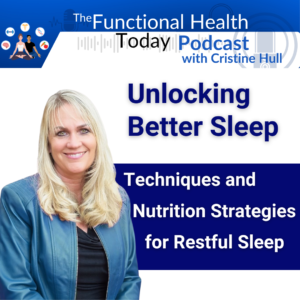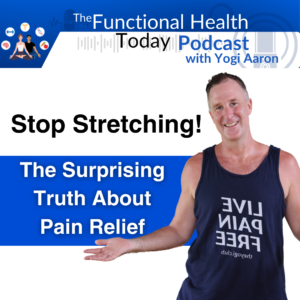
Did You Enjoy This Podcast?
Are you curious about the connection between diet, mental health, and cancer prevention?
Meet Shruti Sethi, a cancer survivor and author of The Healing Power Within. Discover practical tips to improve your health and well-being, and learn how to take control of your nutrition for a healthier life!🌱 Revisiting Your Diet for Health
 Recent studies show that nearly 90% of cancer cases are linked to lifestyle choices, emphasizing the role that nutrition plays in overall health. A cancer diagnosis often leads individuals to reconsider their eating habits, switching to anti-inflammatory diets rich in fruits, vegetables, and whole grains to help boost their immune system. Reducing sugar and processed foods can be pivotal. It’s important to know that high-sugar diets increase insulin resistance and can lead to chronic conditions, including obesity, which are risk factors for cancer.
Recent studies show that nearly 90% of cancer cases are linked to lifestyle choices, emphasizing the role that nutrition plays in overall health. A cancer diagnosis often leads individuals to reconsider their eating habits, switching to anti-inflammatory diets rich in fruits, vegetables, and whole grains to help boost their immune system. Reducing sugar and processed foods can be pivotal. It’s important to know that high-sugar diets increase insulin resistance and can lead to chronic conditions, including obesity, which are risk factors for cancer.

Pop in your email below, and we’ll zip it straight to your inbox so you never lose it!
Understanding the Role of Nutrition in Cancer Care
People with cancer often face challenges related to nutrition during cancer treatment. A healthy diet is crucial; it helps the body cope with the effects of treatment and can alleviate side effects. For instance, fried foods should be avoided as they may lead to inflammation and discomfort.
The American Cancer Society emphasizes that people with cancer often need to adjust their patient’s diet based on the type of cancer and treatments like hormone therapy or chemotherapy. A plant-based diet can enhance overall health and support cancer survivors in their journey to fight infection and maintain strength.
At a cancer center, healthcare professionals help people with cancer understand how to eat enough food while managing symptoms. A well-balanced diet can play a significant role in the ability to feel well and treat cancer effectively, especially for those treated for cancer like colorectal cancer.
How Can Good Nutrition Help Fight Cancer Cells?
 Nutrition is an important part of cancer treatment, as it helps support the body’s needs while fighting cancer and its treatment. A diet full of healthy foods and variety of foods can provide essential nutrients that help prevent the growth of cancer cells and manage side effects of treatment.
Nutrition is an important part of cancer treatment, as it helps support the body’s needs while fighting cancer and its treatment. A diet full of healthy foods and variety of foods can provide essential nutrients that help prevent the growth of cancer cells and manage side effects of treatment.
When you’re not eating enough, it can make it hard to eat due to nausea or other side effects. Eating foods high in phytochemicals and other beneficial nutrients can help you feel better and help patients maintain their strength. Always talk with your doctor to set nutrition goals.
Avoiding foods that contain harmful substances can also help prevent cancer and support oncology efforts. Keeping track of cancer content updates can assist in adjusting your diet to help prevent further issues, ensuring your body can effectively digest food and thrive during treatment.
🥦 Understanding Inflammation
Research indicates that inflammation is a root cause of many chronic diseases, including cancer. Those diagnosed with cancer are often encouraged to limit or eliminate dairy products from their diets. Dairy has been shown in numerous studies to contribute to inflammation. To combat inflammation, shifting to an anti-inflammatory diet can be effective, focusing on natural, unprocessed foods while avoiding refined sugars and excessive dairy.
The Importance of a Balanced Diet for Cancer Patients
For cancer patients, a balanced diet is crucial as their body needs proper nutrition to combat inflammation. Cancer treatment can help, but cancer treatment affect the body’s ability to absorb nutrients. Therefore, eating lots of vegetables and plant foods can aid in recovery.
Including high-calorie foods in moderation, while ensuring the right amount of protein, is vital to keep up your weight. Nutrition and cancer go hand in hand; foods you eat play a significant role in overall health. A dietitian can help tailor diets to meet the specific needs of people undergoing treatment.
Notably, carotenoid-rich foods can reduce the toll on your body from inflammation. Patients may need extra nutrients to maintain good strength during their journey. A well-structured diet not only supports healing but can also lead to cancer prevention in the long run.
💪 Proactive Health Management
 Monitoring nutritional intake and understanding one’s body is essential. Regular blood tests to check for vitamin deficiencies, such as Vitamin D and B12, can influence overall wellness and cancer risks. Many individuals may not realize they have deficiencies that could potentially lead to health issues. A proactive approach encourages individuals to take control of their health by evaluating what they consume and how it affects their bodies.
Monitoring nutritional intake and understanding one’s body is essential. Regular blood tests to check for vitamin deficiencies, such as Vitamin D and B12, can influence overall wellness and cancer risks. Many individuals may not realize they have deficiencies that could potentially lead to health issues. A proactive approach encourages individuals to take control of their health by evaluating what they consume and how it affects their bodies.
Key Vitamins and Minerals for Cancer Patients
For cancer patients, consuming foods like colorful fruits and vegetables is crucial. These foods are rich in carotenoids, which may help boost the immune system and combat oxidative stress. Ensuring adequate intake of essential vitamins and minerals can help keep your strength during treatment and promote overall health.
Essential Proteins and Carbohydrates for Healing
Essential proteins play a crucial role in the healing process, aiding in tissue repair and immune function. They provide the necessary building blocks for regeneration and recovery.
Similarly, carbohydrates are vital as they supply energy, supporting overall metabolism and facilitating the healing process. Together, these nutrients are fundamental for optimal recovery.
Incorporating Whole Grains and Healthy Fats
Incorporating whole grains into your diet can enhance digestion and provide essential nutrients. These grains, such as quinoa and brown rice, are rich in fiber and can help maintain stable energy levels.
Additionally, adding healthy fats like avocados and nuts can support heart health and improve nutrient absorption. Together, these foods create a balanced and nutritious diet.
🌍 Empowering Through Knowledge
Being informed about nutrition allows individuals to make better dietary choices, often resulting in improved health outcomes. Awareness and education can enable patients to not only overcome challenges associated with a cancer diagnosis but to thrive afterward. By prioritizing nutritional health and emphasizing wellness, people can reclaim their lives in the face of adversity, enhancing both body and spirit.
For those struggling with appetite loss during cancer treatment, the Mayo Clinic offers tips to help you get the nutrition you need to support your health.
Did You Enjoy This Podcast?
Are you curious about the connection between diet, mental health, and cancer prevention?
Meet Shruti Sethi, a cancer survivor and author of The Healing Power Within. Discover practical tips to improve your health and well-being, and learn how to take control of your nutrition for a healthier life!













